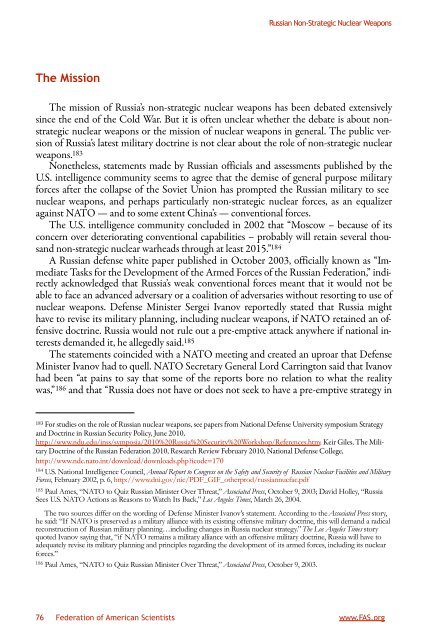Non Strategic Nuclear Weapons - Federation of American Scientists
Non Strategic Nuclear Weapons - Federation of American Scientists
Non Strategic Nuclear Weapons - Federation of American Scientists
You also want an ePaper? Increase the reach of your titles
YUMPU automatically turns print PDFs into web optimized ePapers that Google loves.
The Mission<br />
Russian <strong>Non</strong>-<strong>Strategic</strong> <strong>Nuclear</strong> <strong>Weapons</strong><br />
The mission <strong>of</strong> Russia’s non-strategic nuclear weapons has been debated extensively<br />
since the end <strong>of</strong> the Cold War. But it is <strong>of</strong>ten unclear whether the debate is about nonstrategic<br />
nuclear weapons or the mission <strong>of</strong> nuclear weapons in general. The public version<br />
<strong>of</strong> Russia’s latest military doctrine is not clear about the role <strong>of</strong> non-strategic nuclear<br />
weapons. 183<br />
<strong>Non</strong>etheless, statements made by Russian <strong>of</strong>ficials and assessments published by the<br />
U.S. intelligence community seems to agree that the demise <strong>of</strong> general purpose military<br />
forces after the collapse <strong>of</strong> the Soviet Union has prompted the Russian military to see<br />
nuclear weapons, and perhaps particularly non-strategic nuclear forces, as an equalizer<br />
against NATO — and to some extent China’s — conventional forces.<br />
The U.S. intelligence community concluded in 2002 that “Moscow – because <strong>of</strong> its<br />
concern over deteriorating conventional capabilities – probably will retain several thousand<br />
non-strategic nuclear warheads through at least 2015.” 184<br />
A Russian defense white paper published in October 2003, <strong>of</strong>ficially known as “Immediate<br />
Tasks for the Development <strong>of</strong> the Armed Forces <strong>of</strong> the Russian <strong>Federation</strong>,” indirectly<br />
acknowledged that Russia’s weak conventional forces meant that it would not be<br />
able to face an advanced adversary or a coalition <strong>of</strong> adversaries without resorting to use <strong>of</strong><br />
nuclear weapons. Defense Minister Sergei Ivanov reportedly stated that Russia might<br />
have to revise its military planning, including nuclear weapons, if NATO retained an <strong>of</strong>fensive<br />
doctrine. Russia would not rule out a pre-emptive attack anywhere if national interests<br />
demanded it, he allegedly said. 185<br />
The statements coincided with a NATO meeting and created an uproar that Defense<br />
Minister Ivanov had to quell. NATO Secretary General Lord Carrington said that Ivanov<br />
had been “at pains to say that some <strong>of</strong> the reports bore no relation to what the reality<br />
was,” 186 and that “Russia does not have or does not seek to have a pre-emptive strategy in<br />
183 For studies on the role <strong>of</strong> Russian nuclear weapons, see papers from National Defense University symposium Strategy<br />
and Doctrine in Russian Security Policy, June 2010,<br />
http://www.ndu.edu/inss/symposia/2010%20Russia%20Security%20Workshop/References.htm; Keir Giles, The Military<br />
Doctrine <strong>of</strong> the Russian <strong>Federation</strong> 2010, Research Review February 2010, National Defense College,<br />
http://www.ndc.nato.int/download/downloads.php?icode=170<br />
184 U.S. National Intelligence Council, Annual Report to Congress on the Safety and Security <strong>of</strong> Russian <strong>Nuclear</strong> Facilities and Military<br />
Forces, February 2002, p. 6, http://www.dni.gov/nic/PDF_GIF_otherprod/russiannucfac.pdf<br />
185 Paul Ames, “NATO to Quiz Russian Minister Over Threat,” Associated Press, October 9, 2003; David Holley, “Russia<br />
Sees U.S. NATO Actions as Reasons to Watch Its Back,” Los Angeles Times, March 26, 2004.<br />
The two sources differ on the wording <strong>of</strong> Defense Minister Ivanov’s statement. According to the Associated Press story,<br />
he said: “If NATO is preserved as a military alliance with its existing <strong>of</strong>fensive military doctrine, this will demand a radical<br />
reconstruction <strong>of</strong> Russian military planning…including changes in Russia nuclear strategy.” The Los Angeles Times story<br />
quoted Ivanov saying that, “if NATO remains a military alliance with an <strong>of</strong>fensive military doctrine, Russia will have to<br />
adequately revise its military planning and principles regarding the development <strong>of</strong> its armed forces, including its nuclear<br />
forces.”<br />
186 Paul Ames, “NATO to Quiz Russian Minister Over Threat,” Associated Press, October 9, 2003.<br />
76 <strong>Federation</strong> <strong>of</strong> <strong>American</strong> <strong>Scientists</strong> www.FAS.org
















